D-Day: Discovering the father I never knew
- Published
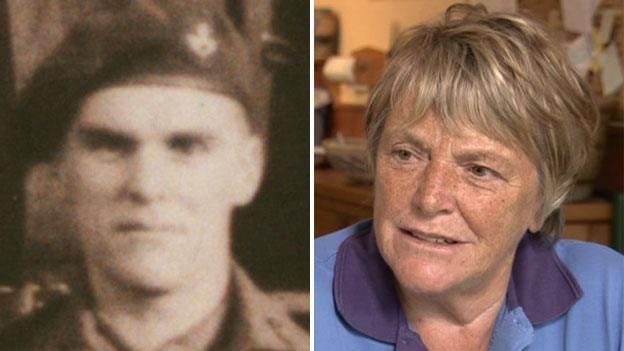
Margaret Brotheridge knew little about her father, Den, until she was nearly 40 years old
Lt Den Brotheridge was the first allied soldier killed in combat on D-Day. When he left to go to war, his wife was eight months pregnant with their first child. Yet it took his daughter 40 years to discover her father's role in one of D-Day's most famous operations.
At 22:40 on Monday 5 June 1944, six wooden gliders carrying 181 men from the Ox and Bucks Light Infantry swept into the sky from Tarrant Rushton airfield in Dorset.
Towed by Halifax bombers, they were heading for two small bridges over the River Orne and Caen Canal in Normandy.
The aim of the operation, codenamed 'Deadstick', was to land the gliders near the bridges and capture them from the Germans. Holding the bridges would prevent German tanks getting to the beaches where allied troops would land the following morning.
In one of the gliders was Lt Brotheridge. A talented footballer and cricketer, he had signed up at the beginning of the war and been promoted from the ranks to become an officer.
He and his wife Maggie had married four years earlier and she was at home in Smethwick, in the West Midlands, heavily pregnant with their first child.
At 00:16 on D-Day the gliders crash landed just yards from the bridge at Benouville, now called Pegasus Bridge. The men of Lt Brotheridge's 25 platoon stormed across the bridge.
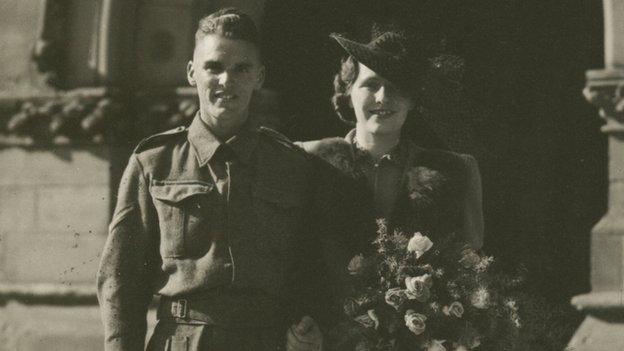
Den and Margaret Brotheridge were expecting their first child when he went to war
There was a short, sharp firefight with the Germans and the bridge was taken. But, as Lt Brotheridge went back and forth across the bridge, a German machine gun opened up again and he was hit in the back of the neck. He died a short while later without regaining consciousness.
Just 19 days later Maggie gave birth to a baby girl and named her Margaret. Now living in Honiton, Devon, she is approaching her 70th birthday.
She said: "I knew he had died in the war. My mother remarried when I was four and she didn't talk about it. When my mother married again my grandparents [Lt Brotheridge's parents] didn't like it.
"I went to see them twice but they didn't connect so I didn't know any of that family at all. My mother never talked about them for whatever reason known to her. I can't blame anybody, it's just circumstances isn't it?"
It was not until the 40th anniversary of D-Day in 1984 that Margaret discovered what had happened to her father.
"I found out just before I was 40. I opened up the paper and there was this big picture of my father's group and it had 'Brotheridge' on it and I said 'Oh my, just look at this.'"
With the help of surviving members of her father's unit, Margaret was able to piece together what had happened to him.
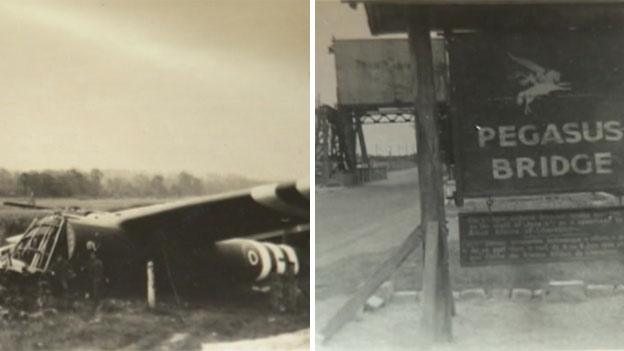
The glider crashed near Pegasus Bridge
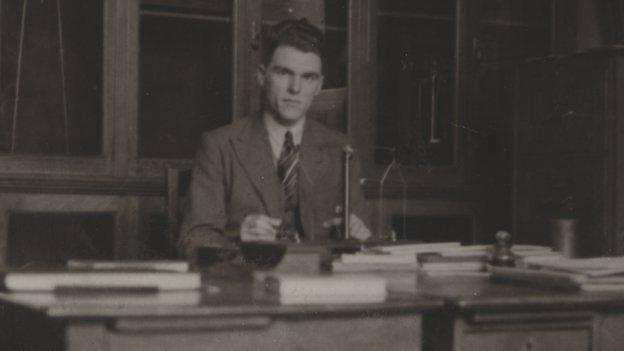
Lt Brotheridge led his platoon in Operation Deadstick, to capture Pegasus Bridge in Normandy
"He was very much a person of the people, he wasn't a typical officer," she said.
"I met his batman [officer's servant] who was an absolutely lovely man and he talked about him being very likeable. He said he often thought he would get told off because he [Lt Brotheridge] would polish his own boots.
"He would sit and talk to his men about football. I wouldn't ever have wanted him to pull rank.
"They respected him and they would follow him. A couple of men I met said they would have followed him to the death and that's the best thing you would like to hear."
Very few of the men who took part in Operation Deadstick are still alive. One is Pte Frank Bourlet who was on the same glider as Den Brotheridge.
Now 91 and living in Hampshire, he told the BBC: "He seemed a very, very nice chap. He didn't use his rank a great deal. You felt comfortable with him, that was the main thing."
Mr Bourlet was close to Lt Brotheridge during the attack on the bridge.
He said: "He was up on the corner shouting 'Come on 25! - Come on 25!' That's the last words he ever said.
"We were very upset amongst ourselves. Everybody was upset. To miss Danny, so out of the blue, you just couldn't take it in."
When her mother died, Margaret found her father's medals in a box. She has no children of her own and has given the medals to The Royal Green Jackets Museum in Winchester so that something of his sacrifice will remain.
She said: "He's a symbol of all of them really. He was recommended for the Military Cross but because he died too soon it had to be rescinded - ridiculous isn't it?"
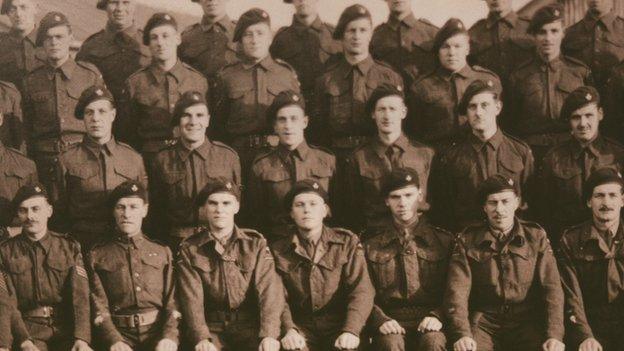
Margaret donated her father's medals to the Royal Green Jackets Museum